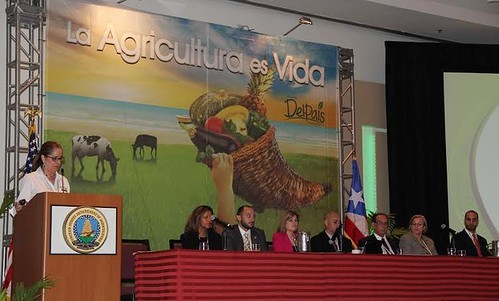
In any business venture, the key to reaching a new market is starting with accurate and comprehensive information. For American agricultural producers and suppliers looking at USDA feeding programs as a potential market, having a clear understanding of the rules, regulations and requirements is the best start on the path to success. USDA encourages new businesses to participate by providing information through our websites, publications, and conferences. Recently, we attended Puerto Rico’s 2013 Market Expansion Conference to encourage new businesses to consider our programs.
My agency, the Agricultural Marketing Service (AMS), is part of a team of seven USDA agencies that attended this conference to strengthen Puerto Rico’s agriculture sector.
From 1992 to 2007, the number of farms on the island decreased by 30%, the amount of land being farmed decreased by 33% and the amount of livestock and poultry products sold dropped by nearly 19%. The agriculture sector also experienced a 33% reduction in hired workers. As a result, Puerto Rico is importing about 85% of its food, driving prices higher for residents.
The goal of the conference is to try to reverse these trends. Working together, conference attendees plan to encourage producers and processors to participate in USDA programs, increase local fresh produce in school feeding programs, and strengthen the bond between the community and its farmers. I went to the conference to show Puerto Rican farmers and businesses that AMS commodity purchasing programs are a viable market for their products.
Last year, the AMS Commodity Procurement Staff purchased nearly $1.6 billion of food from our nation’s producers. These purchases supported USDA feeding programs like the National School Lunch Program. By informing Puerto Rican businesses about the federal procurement processes and how to become approved vendors, we will set them up to compete for contracts to supply one of 250 foods offered in our programs.
It appears that the Market Expansion Conference is making a difference. Since the inaugural event in 2011, the island’s local producers have increased business with its schools. There has also been an increase in the number of jobs in the agriculture sector. This progress is especially exciting for me—a graduate of the University of Puerto Rico at Aguadilla who hopes to see even more economic opportunities created for the island.
I had the pleasure of hearing first-hand what USDA’s programs mean to the island’s producers and businesses. During my presentation, one of the conference attendees thanked me for assisting him during a phone call several months ago. He told the audience that, because of my help he is now one step closer to becoming an approved vendor. It is gratifying to know that I may have opened a door for his business. While it may seem small, each new opportunity strengthens the island’s economy and helps to decrease an unemployment rate that hovers around 16%.
AMS is committed to supporting our nation’s producers in Puerto Rico and the rest of the country. Through this and other events like the upcoming 2014 Industry Meeting, we maintain a continuous dialog about our commodity purchasing programs with vendors, industry organizations and other stakeholders. Together, we will continue to create opportunities for American agricultural producers.

